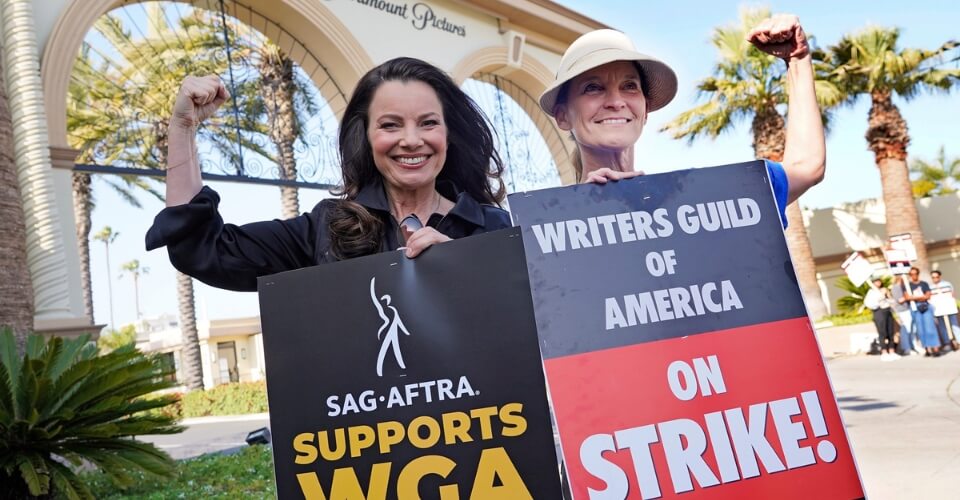The Screen Actors Guild, or SAG, represents actors’ interests and demands equal treatment. In the entertainment industry, actors play a major role in adding faces to the story and emotions to the script on the big or small screen. However, based on the recent events, it is understandable why they felt frustrated, which caused the recent SAG strike.
The SAG strike is not a recent phenomenon; it has a long history dating back to the early days of the film industry. The last time writers (WGA) and performers (SAG-AFTRA) went on strike was 63 years ago.
Back then and even now, the strike is about the betterment of the entertainment community. As per sources, the recent strike involved several factors that contributed to the occurrence of a SAG strike.
The current SAF-AFTRA strike is based on the following key issues:
- Fair compensation for all.
- Recover the gap between actors’ remunerations and production house incomes.
- Inclusivity and diversity by all means.
- Improved and respectable working conditions.
Why Is SAG Currently on Strike, and Why Does It Matter?
The SAG-AFTRA is joining hands to come up with better working conditions for the existing and upcoming generations. The current scenarios have forced people from the industry to raise their voices. Here is why?
Fair Compensation: The union wants better wages, equal benefits, and improved working conditions for anyone involved in the entertainment industry. For example, actors often have to work long hours and face strenuous demands with uncertain employment opportunities.
Streaming Services: The digital revolution gave birth to OTT platforms like Netflix, Hulu, and Amazon Prime. The production houses have largely benefited from the situation and have sidelined the rest of the industry. One of the common factors that led to the strike is the compensation model. They are still for actors in the streaming era, despite the boom in the industry. SAG is on strike to push for pay agreements that are fair and reasonable for actors who work on streaming services. Concerns like residuals, which are payments actors receive when their work is reused or syndicated, are among the issues that must be addressed in this.
Inclusivity and Diversity: The union is advocating for the betterment of the underrepresented groups that are still being undermined. This strike gives people a chance to voice their concerns about stereotypes being portrayed, the lack of diversity in casting decisions, and the general exclusion of diverse viewpoints from the industry.
Improved Working Conditions: The SAG strike aims to improve these working conditions and ensure that actors are treated with the respect and care they deserve. In particular, this entails addressing concerns like set safety, acceptable rest periods, and harassment and discrimination protections.
Solidarity and Collective Bargaining: Members of SAG demonstrate their support for one another and their commitment to working together by going on strike. The power of their collective voice has the potential to significantly alter the industry and guarantee the protection and observance of actors’ rights.
What Consequences Can Be Expected from the SAG Strike?
The SAG strike has collectively roped in 11000+ WGA and 160,000+ SAG-AFTRA members. It would not be incorrect to say that Hollywood is closed for business. Movies such as Barbie, Mission Impossible, Oppenheimer, and many others wouldn’t have the red carpet as planned. Next week’s comic-con will showcase no superheroes.
All of this is because the postponed productions cost both the actors’ and the production companies’ businesses money. There is not enough fresh content for movie theaters, television networks, and streaming services, which lowers their profits. Numerous people who depend on the industry for work are also affected because the strike has an impact on their way of life.
Several parties are instrumental in determining the outcome of a SAG strike. These people are the actual actors, SAG as the union that represents them, production companies, studios, and other experts in the field. Due to the unique interests and viewpoints of each group, the issues at hand must be resolved through lengthy negotiations and discussions.
To all this, production giants like Disney responded. Disney CEO Bob Iger told CNBC-
“Very damaging effect on the whole industry.”
“There’s a level of expectation that [SAG-AFTRA and the WGA] have that is just not realistic.”
It is crucial to keep in mind that production houses are diverse, and as a result, their reactions to the SAG strike might differ. Some might choose to express their concerns more outspokenly, while others might prefer to negotiate in secret.
In the end, producing high-quality work and fostering a positive working environment are goals that both actors and production companies have in common.
Source: CNBC

